Magnesium is a mineral that plays a crucial role in maintaining good health. It is involved in many important bodily functions, including energy production, muscle and nerve function, and bone health. Despite its importance, many people do not get enough magnesium in their diets. In fact, magnesium deficiency is a common problem worldwide.
One way to ensure that you are getting enough magnesium is to include magnesium-rich foods in your diet. There are many foods that are naturally high in magnesium, including leafy green vegetables, nuts, seeds, and whole grains. In this article, we will explore the top 10 foods with high magnesium and their health benefits.
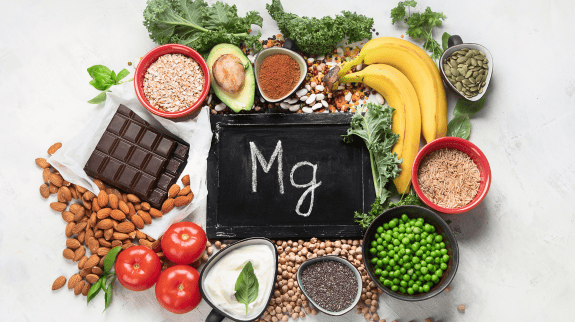
KEY TAKEAWAYS
- Magnesium is a crucial mineral that is involved in many important bodily functions.
- Many people do not get enough magnesium in their diets, which can lead to health problems.
- Including magnesium-rich foods in your diet can help ensure that you are getting enough of this important mineral.
Understanding Magnesium
Role of Magnesium
Magnesium is an essential mineral that plays a crucial role in many bodily functions. It is involved in more than 300 biochemical reactions in the human body, including muscle and nerve function, blood sugar regulation, and energy production. Magnesium also helps to maintain a healthy heart, bones, and immune system.
One of the most important functions of magnesium is its role in muscle and nerve function. Magnesium helps to regulate the contraction and relaxation of muscles, including the heart muscle. It also plays a role in the transmission of nerve impulses and the release of neurotransmitters, which are chemicals that transmit signals between nerve cells.
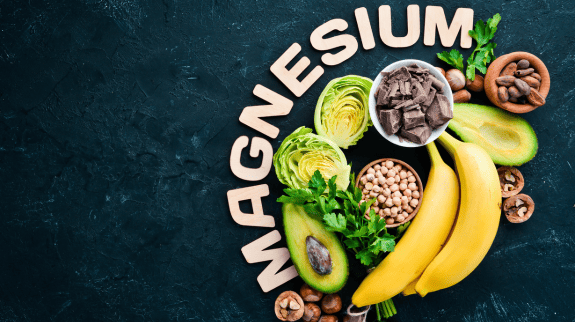
Recommended Daily Intake
The recommended daily intake of magnesium varies depending on age and gender. According to the National Institutes of Health (NIH), the recommended daily intake of magnesium for adults is:
- 400-420 mg for men
- 310-320 mg for women
However, certain groups may require more serious magnesium supplementation, such as pregnant women and individuals with certain health conditions. It is important to speak with a healthcare provider to determine the appropriate daily intake of magnesium for each individual.
Magnesium can be obtained through a balanced diet that includes magnesium-rich foods. The following section will highlight the top 10 foods that are high in magnesium.
Top 10 Foods with High Magnesium
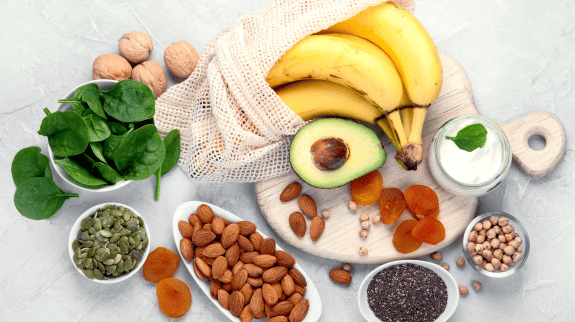
Magnesium is an essential mineral that plays a vital role in various bodily functions, including muscle and nerve function, blood sugar regulation, and bone health. Here are the top 10 foods that are rich in magnesium:
Green Leafy Vegetables
Green leafy vegetables are an excellent source of magnesium. Spinach, kale, and Swiss chard are some of the best examples. One cup of cooked spinach contains about 157 mg of magnesium, which is 39% of the daily recommended intake for adults.
Nuts and Seeds
Nuts and seeds are also a great source of magnesium. Almonds, cashews, and pumpkin seeds are some of the best examples. One ounce of almonds contains about 80 mg of magnesium, which is 20% of the daily recommended intake for adults.
Legumes
Legumes, such as black beans, kidney beans, and lentils, are another excellent source of magnesium. One cup of cooked black beans contains about 120 mg of magnesium, which is 30% of the daily recommended intake for adults.
Whole Grains
Whole grains, such as brown rice, quinoa, and oats, are also a good source of magnesium. One cup of cooked brown rice contains about 84 mg of magnesium, which is 21% of the daily recommended intake for adults.
Dark Chocolate
Dark chocolate is not only delicious but also a good source of magnesium. One ounce of dark chocolate with at least 70% cocoa contains about 64 mg of magnesium, which is 16% of the daily recommended intake for adults.
Avocado
Avocado is a nutritious fruit that is also a good source of magnesium. One medium-sized avocado contains about 58 mg of magnesium, which is 15% of the daily recommended intake for adults.
Bananas
Bananas are not only a good source of potassium but also a decent source of magnesium. One medium-sized banana contains about 32 mg of magnesium, which is 8% of the daily recommended intake for adults.
Dairy Products
Dairy products, such as milk and yogurt, are also a good source of magnesium. One cup of plain yogurt contains about 47 mg of magnesium, which is 12% of the daily recommended intake for adults.
Fish
Fatty fish such as salmon and mackerel, are not only a good source of omega-3 fatty acids but also a decent source of magnesium. One fillet of salmon contains about 53 mg of magnesium, which is 13% of the daily recommended intake for adults.
Tofu
Tofu is a popular vegetarian protein source that is also a good source of magnesium. One-half cup of firm tofu contains about 31 mg of magnesium, which is 8% of the daily recommended intake for adults.
These foods are all excellent sources of magnesium and can help you meet your daily recommended intake.
Benefits of Foods with High Magnesium
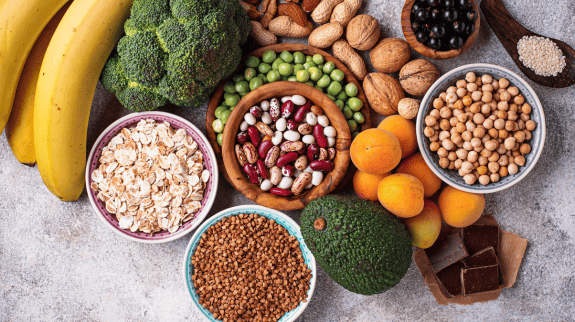
Magnesium is a vital mineral that plays a crucial role in numerous bodily functions and brain health. It is necessary for maintaining healthy bones, muscles, and nerves, and it also helps to regulate blood pressure, control blood sugar levels, and support a healthy immune system.
Eating a diet that is rich in magnesium can offer many health benefits. Here are some of the benefits of consuming foods that are high in magnesium:
1. Supports Bone Health
Magnesium is essential for maintaining healthy bones. It works together with calcium and vitamin D to keep bones strong and healthy. Studies have shown that people who consume a diet that is high in magnesium have a higher bone density and a lower risk of osteoporosis.
2. Helps to Regulate Blood Pressure
Magnesium plays a crucial role in regulating high blood pressure. It helps to relax the blood vessels, which can help to lower blood pressure. Studies have shown that consuming a diet that is high in magnesium can help to lower blood pressure levels in people with hypertension.
3. Supports a Healthy Immune System
Magnesium is essential for maintaining a healthy immune system. It helps to regulate the immune response and can help to reduce inflammation in the body. Studies have shown that people who consume a diet that is high in magnesium have a stronger immune system and a lower risk of developing infections.
4. Helps to Control Blood Sugar Levels
Magnesium plays a crucial role in regulating blood sugar levels. It helps to control insulin sensitivity and can help to reduce the risk of developing type 2 diabetes. Studies have shown that people who consume a diet that is high in magnesium have more blood sugar control and a lower risk of developing type 2 diabetes.
5. Reduces the Risk of Heart Disease
Magnesium is essential for maintaining a healthy heart. It helps to regulate heart rhythm, control blood pressure, and reduce inflammation in the body. Studies have shown that people who consume a diet that is high in magnesium have a lower risk of developing heart disease.
Incorporating magnesium-rich foods into your diet can offer many health benefits. By consuming a variety of foods that are high in magnesium, you can support your overall health and well-being.
Risks of Magnesium Deficiency
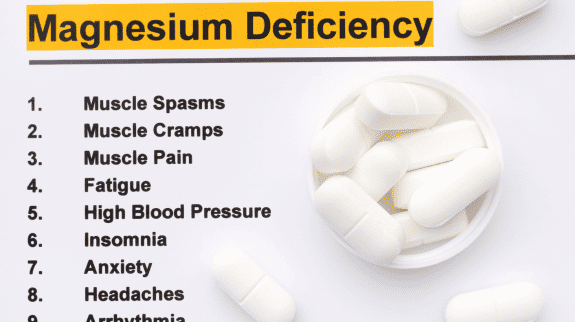
Magnesium is an essential mineral that plays a vital role in numerous physiological functions such as nerve function, muscle contraction, and bone development. A deficiency in magnesium can lead to various health complications.
According to the Office of Dietary Supplements, magnesium deficiency is rare in healthy individuals. However, certain groups of people are at a higher risk of magnesium deficiency. These include individuals with gastrointestinal diseases such as Crohn’s disease or celiac disease, individuals with type 2 diabetes, and older adults.
Symptoms of magnesium deficiency may include muscle cramps, weakness, and fatigue. Severe magnesium deficiency can lead to more serious symptoms, such as numbness, tingling, seizures, and abnormal heart rhythms.
Magnesium deficiency has also been linked to an increased risk of several chronic diseases, including type 2 diabetes, hypertension, and osteoporosis. Inadequate magnesium intake may also contribute to the development of migraines, depression, and anxiety.
It is important to note that excessive magnesium intake can also be harmful. Therefore, it is recommended to consult a healthcare professional before taking magnesium supplements. Magnesium supplements should only be taken under the supervision of a healthcare provider, especially for individuals with kidney problems or taking certain medications.
In conclusion, magnesium deficiency can lead to various health complications, and certain groups of people are at a higher risk of magnesium deficiency. It is essential to maintain adequate magnesium intake through a balanced diet or supplements under the guidance of a healthcare professional.
Conclusion

In conclusion, magnesium is an essential mineral that plays a crucial role in many bodily functions. It is involved in over 300 enzymatic reactions, including energy production, protein synthesis, and muscle and nerve function.
The top 10 foods high in magnesium are spinach, almonds, cashews, peanuts, avocado, black beans, edamame, quinoa, tofu, and dark chocolate. These foods are not only high in magnesium but also provide many other nutrients. For example, spinach is high in vitamin K, while avocado is high in healthy fats and fiber.
It is important to note that while getting enough magnesium is important, consuming too much magnesium can lead to adverse effects. Therefore, it is recommended to obtain magnesium through a balanced diet rather than supplements unless advised by a healthcare professional.
Overall, incorporating magnesium-rich foods into a healthy diet can help maintain optimal health and prevent deficiencies.
Frequently Asked Questions

What are some fruits that are high in magnesium?
Some fruits that are high in magnesium include bananas, avocados, and figs. One medium-sized banana contains about 32 mg of magnesium, while one avocado contains about 58 mg of magnesium. One medium-sized fig contains about 24 mg of magnesium.
What are some foods with more magnesium than milk?
While milk is a good source of magnesium, there are many other foods that contain more magnesium. Some of these foods include almonds, spinach, and black beans. One cup of cooked spinach contains about 157 mg of magnesium, while one cup of cooked black beans contains about 120 mg of magnesium. One ounce of almonds contains about 80 mg of magnesium.
Also read: Top 50 foods high in calcium
What are some vegetables that are high in magnesium?
Some vegetables that are high in magnesium include spinach, Swiss chard, and kale. One cup of cooked spinach contains about 157 mg of magnesium, while one cup of cooked Swiss chard contains about 150 mg of magnesium. One cup of cooked kale contains about 40 mg of magnesium.
What are some signs of low magnesium?
Some signs of low magnesium include muscle cramps, muscle weakness, fatigue, and loss of appetite. Other signs may include nausea, vomiting, and tingling or numbness in the hands and feet.
What are some foods with more magnesium than almonds?
While almonds are a good source of magnesium, there are many other foods that contain more magnesium. Some of these foods include pumpkin seeds, spinach, and black beans. One ounce of pumpkin seeds contains about 150 mg of magnesium, while one cup of cooked spinach contains about 157 mg of magnesium. One cup of cooked black beans contains about 120 mg of magnesium per can.
What are some ways to quickly raise magnesium levels?
Some ways to quickly raise magnesium levels include taking magnesium supplements, eating magnesium-rich foods, and using magnesium oil or lotion topically. However, it is important to talk to a healthcare professional before supplementing with magnesium, as too much magnesium can be harmful.

